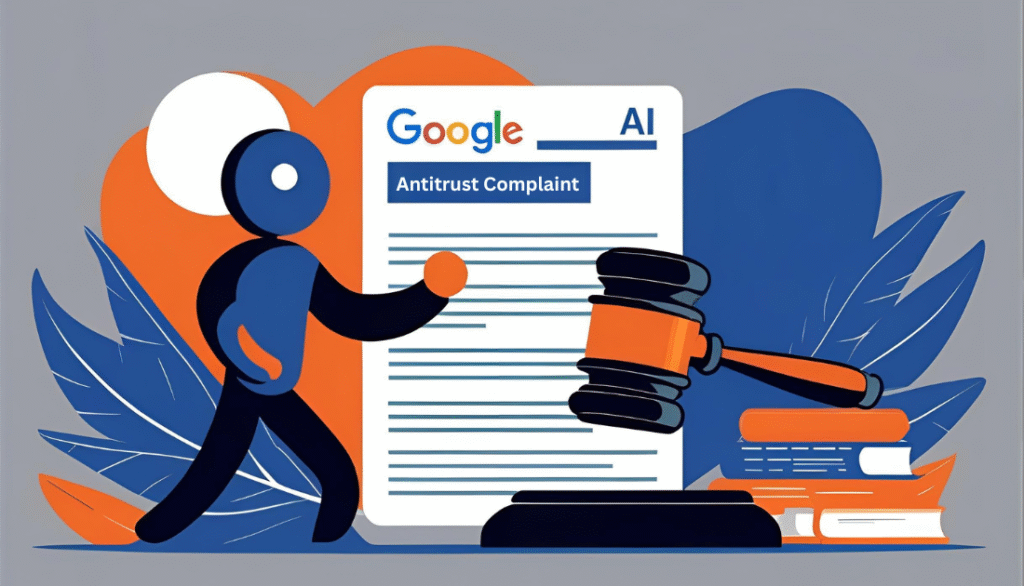Alphabet’s Google is facing a formal antitrust complaint in the European Union, filed by a coalition of independent publishers concerned about the impact of its AI Overviews feature on digital visibility, traffic, and revenue.
HIghlights
- Formal Complaint Filed: Independent publishers in the EU submitted an antitrust complaint against Google on June 30, citing damage from its AI Overviews feature.
- AI Overviews Explained: Google’s AI-generated summaries appear at the top of search results, often displacing traditional links and recently started showing ads.
- Publisher Backlash: Critics argue the feature uses publisher content without permission and lacks a fair opt-out option that maintains visibility.
- Threat to Independent Journalism: Advocacy group Foxglove Legal calls the feature an “existential threat” to smaller, independent news outlets.
- Google’s Defense: Google claims AI Overviews boost discovery and that traffic fluctuations are due to other factors like search algorithm changes.
- US Lawsuit Parallel: Chegg filed a related lawsuit in February, claiming the AI feature harmed its traffic, quality, and business model.
- DMA in Play: The complaint intensifies regulatory scrutiny under the EU’s Digital Markets Act, which aims to limit the dominance of Big Tech firms.
- Proposed Remedies: Google introduced a new compliance option—“Option B”—that adds “free link” boxes below AI responses to address regulatory concerns.
The complaint, submitted on June 30 and reviewed by Reuters, requests interim measures to limit the reach of the AI Overviews tool while regulators assess its broader implications.
What Are AI Overviews?
AI Overviews are auto-generated summaries that appear at the top of Google’s search results, often above traditional blue links. Since their global rollout in May—across 100+ countries and 40+ languages—Google has also started testing advertisements within these summaries.
The company positions this feature as part of its larger transition to “AI-first” search, claiming it improves user experience by directly addressing queries. However, concerns have grown among content creators, particularly independent publishers.
Publishers’ Concerns
According to the complaint, the summaries are generated using web content—including publishers’ material—without offering a clear opt-out mechanism. The only current workaround is to block Google entirely, which effectively removes sites from search results and severely limits online reach.
The Independent Publishers Alliance, the group behind the complaint, is backed by advocacy organizations such as the Movement for an Open Web and UK-based nonprofit Foxglove Legal.
They argue that Google’s dominance in search enables it to determine which content is surfaced, reshaping the dynamics of digital publishing.
Rosa Curling, co-director at Foxglove, described the situation as an “existential threat” to independent journalism, emphasizing the need for regulation that allows publishers to opt out of AI usage without losing search engine visibility.
Google’s Response
Google has rejected claims that AI Overviews significantly harm publisher traffic. A spokesperson stated that billions of visits are directed to websites daily, with fluctuations typically resulting from seasonal trends, changes in user behavior, or search algorithm updates.
The company argues that AI Overviews actually broaden the scope of user queries, potentially opening up new avenues for content discovery.
Chegg’s U.S. Lawsuit
The EU complaint follows a related lawsuit in the United States, filed in February by educational technology company Chegg. The company became the first to launch an antitrust case targeting Google’s AI Overviews, alleging that the feature:
- Compels platforms to contribute content without compensation
- Undermines digital publishing and reduces content quality
- Caused a “significant drop” in user traffic and subscribers
DMA and Rising Pressure in the EU
The complaint comes amid broader scrutiny under the European Union’s Digital Markets Act (DMA), which targets the market dominance of large tech platforms.
In early July:
- Google defended its practices before the European Commission, arguing that DMA compliance has increased costs and stifled innovation, particularly in sectors like travel and hospitality.
- The company proposed new compliance options—referred to as “Option B”—which include adding “free link” boxes beneath AI-generated results to address regulator concerns and avoid fines that could reach 10% of global revenue.
A Turning Point for AI and Content Control
The Independent Publishers Alliance, though it hasn’t publicly disclosed its members, presents itself as a nonprofit committed to the future of independent publishing.
With mounting concerns from both sides of the Atlantic, Google’s AI Overviews have become a central issue in a wider debate about artificial intelligence, platform dominance, and the reshaping of online information ecosystems.


